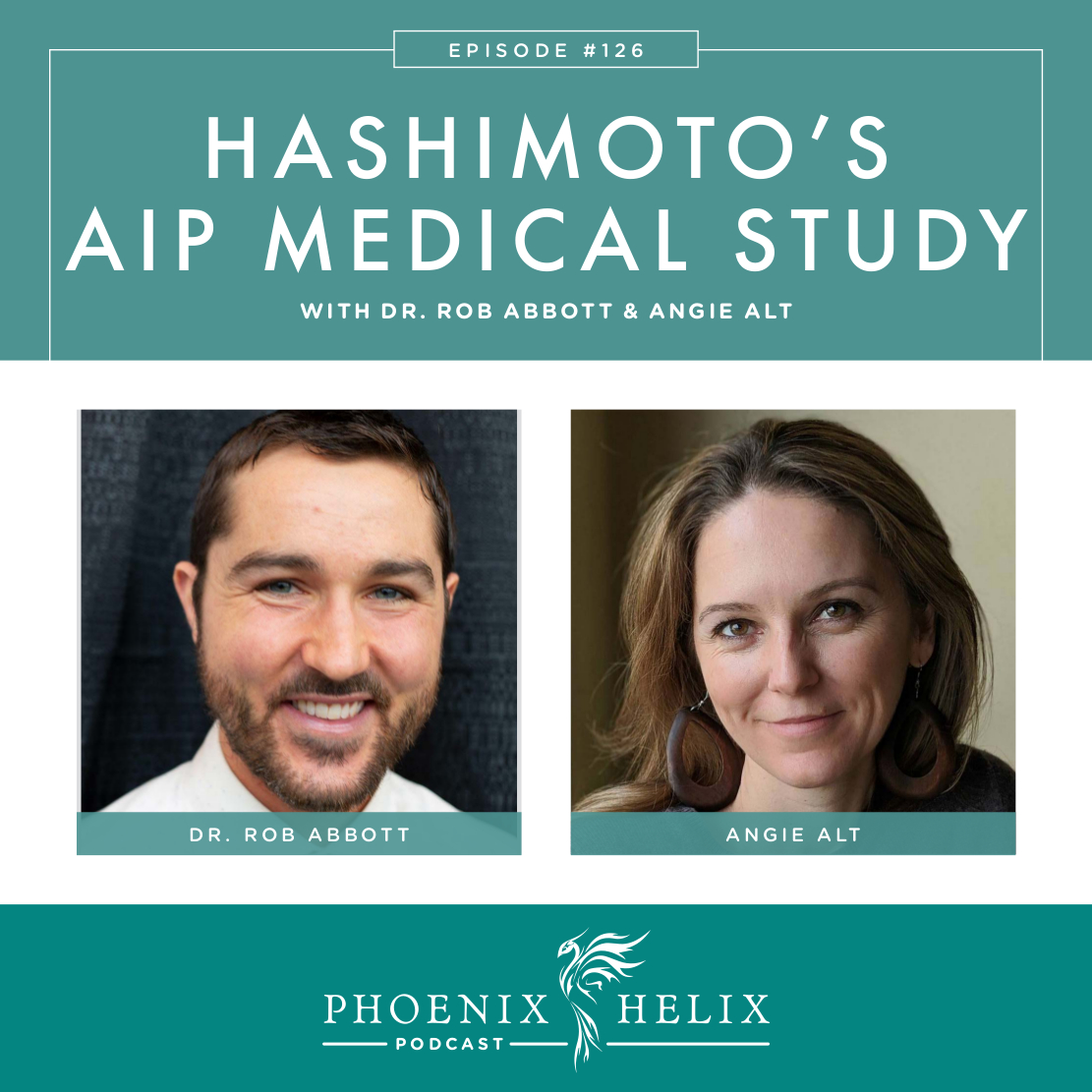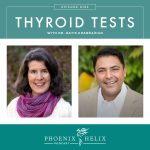
Exciting Research
In 2017, the first official medical study was done using the paleo autoimmune protocol as an intervention for autoimmune disease. That study focused on Inflammatory Bowel Disease, and 73% of patients achieved remission. Listen to Episode 83 of my podcast for details. In today’s episode, I’m excited to share the results of the second medical study, this time looking at the AIP as an intervention for Hashimoto’s Thyroiditis. The results were equally impressive! My guests are Dr. Rob Abbott (physician and lead researcher), and Angie Alt (whose AIP class was used in both studies).
Listen to the Show
- Subscribe to my podcast through your favorite podcast app: iTunes, Stitcher, Google, TuneIn, Spotify, Amazon, etc.
- You can also listen to the episode right here through the player below, and if you subscribe to my newsletter you’ll get notified of future episodes.
Podcast: Play in new window | Download
Show Notes
- Intro (0:00)
- Thank You to our Podcast Sponsor: Wild Zora (2:20)
- A paleo food company that specializes in dehydrated foods, including delicious meat & veggie bars, instant soups, camping meals, and cold-steeped instant teas. Their goal is to fuel people for health, travel, and time outdoors.
- They have an AIP line of products, which they continue to expand. Right now, it includes two meat & veggie bars: Mediterranean Lamb and Apple Pork, an instant soup: Lemon Chicken, and two dehydrated camping meals: Summit Savory Chicken and Mountain Beef Stew.
- They’re an ethical company that cares about the health of people, animals, and the environment. They have personally visited all the farms that supply their business to ensure the animals are humanely raised in natural environments. All of their packaging is BPA-Free, and their production facility is 100% gluten-free. Their products are also nutrient-dense. When you dehydrate a food, meat dehydrates to nearly 50% of its original fresh-weight, and veggies by up to 90%! This means that their products have 3X the nutrient density of non-dehydrated foods.
- Place an order here, and use the code PHOENIX1 for 15% off your first order.
- Angie’s Dream of Doing Medical Research on the AIP (4:15)
- After 11 years of illness when conventional medicine failed to help Angie, she found the paleo autoimmune protocol, and it was the first intervention that improved her symptoms and restored her quality of life. She dreamed of doing research from that moment. Two years later, she started her online group coaching class, SAD to AIP in SIX, and the success of her participants solidified that dream. However, she thought it would take about 20 years to achieve. Instead, two years later, one AIP follower caught the attention of his gastroenterologist. Her name was Dr. Gauree Konijeti, and she contacted Angie about potentially conducting some research together. That became the first medical study into the AIP for IBD.
- Angie’s goal is to show doctors that the paleo autoimmune protocol, especially when introduced in a group health coaching format, can be an effective mainstream option for managing autoimmune disease.
- Rob’s Path to Functional Medicine and AIP Research (8:00)
- Rob developed health problems during his first year of medical school, which forced him to take a year off. During that time, his own efforts to heal led him to discover functional medicine and the paleo diet and lifestyle. When he returned to school, he knew he wanted to pursue that as a career. He was a rebel student, handing out Autoimmune Wellness resources to patients and fellow students alike.
- During his year off, Rob helped with a positive psychology research study for cardiac patients. There, he learned the value of listening and taking detailed life histories. During his fourth year of medical school, he led a research study into mindfulness training for students. There, he learned about research protocols, approvals, and funding. Both experiences helped prepare him for the Hashimoto’s AIP Medical Study.
- Rob now has a private practice called Resilient Roots Functional and Evolutionary Medicine. He is also the Medical Advisor for Autoimmune Wellness, and publishes scientific reviews there.
- What Is Hashimoto’s and How Is It Normally Treated? (14:15)
- Hashimoto’s disease, also known as chronic lymphocytic thyroiditis, is an autoimmune disease where the immune system attacks the thyroid. It’s one of the most common autoimmune diseases, and is the most common cause of hypothyroidism (where the body isn’t producing enough thyroid hormone).
- Many people with hypothyroidism aren’t aware they have Hashimoto’s. Doctor’s often won’t test for antibodies because they don’t see it as important. The only treatment offered is thyroid hormone replacement medication, but only if lab values show a TSH >10 (which is a sign that the brain is sending higher requests for thyroid hormone because it’s not being produced at a normal level). For this reason, often irreversible damage has been done before medication is offered, and nothing is done to address the autoimmune process.
- Response to medication varies. For some patients, it does resolve all symptoms. For others, symptoms remain in spite of the medication.
- It’s also possible to have Hashimoto’s without having antibodies.
- Resource Podcasts:
- Hashimoto’s AIP Study Overview (20:44)
- This wasn’t just an AIP Diet study. Instead, it was a multi-faceted approach which combined the AIP diet with group health coaching, individual functional medicine consultation, community support within the group format, and coaching on both diet and lifestyle measures (sleep hygiene, stress management, etc.)
- 17 people participated in the study. They were all women living within the USA between the ages of 20-45. To qualify for the study, they needed a confirmed Hashimoto’s diagnosis, a primary care physician, access to labs for testing, and no prior experience successfully implementing the AIP on their own.
- The primary goal of the study was to see if the participants would experience improvements in quality of life and symptom burden.
- The secondary goal was to see if lab values improved. (But how participants felt was seen as the more important measure.)
- Resource: Unconventional Medicine by Chris Kresser.
- Thank You to our Podcast Sponsor – Paleo on the Go (30:26)
- A frozen meal delivery service, 100% of their menu is compliant with the elimination phase of the paleo autoimmune protocol (AIP). They have over 5o items, including entrees, side dishes, broth, AIP-friendly bacon, and desserts.
- Use the code PHOENIX for 10% off your first order.
- What Were the Study Results? (31:29)
- Quality of life improved in all areas measured. The biggest improvements were seen in physical functioning, energy, mental health, and bodily pain.
- Symptom burden decreased dramatically, reducing fatigue, pain, digestive issues, brain fog, skin issues, and more.
- Almost 50% of participants were able to reduce their thyroid medication.
- Antibodies didn’t reduce but the baseline among participants was pretty low to begin with. Dr. Abbott believes that antibodies are helpful at diagnosis, but they don’t necessarily correlate with symptoms. Reducing symptoms is more important than reducing antibodies.
- Inflammation as measured by the marker hs-CRP decreased by 30%.
- Resources:
- Full Research Article published in Cureus Journal.
- Summary of the Research published on Autoimmmune Wellness.
- What Are Healthy Levels of Thyroid Antibodies?
- Individual Case Studies (37:20)
- The only woman who wasn’t able to complete the study left because she got pregnant. Prior to beginning the study, she experienced problems with fertility, so this was an excellent outcome.
- The study also included functional medicine testing:
- Stool testing found pathogens, bacterial imbalances, and yeast in some participants. No treatment was given, yet many of these resolved by the end of the study, simply through the implementation of the paleo autoimmune protocol.
- Similarly, some vitamin and mineral deficiencies resolved, and omega 3:6 ratios improved.
- Heavy metals were found in some participants. They weren’t put on any kind of detox protocol. Instead, they were given the recommendation to incorporate cilantro and parsley into their diet, blending them into their daily bone broth. At the end of the study, the metals had dropped to within the normal range.
- Angie’s Online AIP Group Coaching Class (41:03)
- Update 2022: Angie is no longer teaching her group coaching class, but instead supports a new virtual platform called WellTheory based on a similar model.
- Other Resources:
- Book: Autoimmune Wellness Handbook (which includes a 12-week lifestyle transition plan).
- Podcast: Ep. 78 – Sticking To It. Staying on the Paleo AIP Wagon.
- Strengths and Limitations of the Study (45:51)
- Strengths:
- Multi-faceted design that including personalized care, health coaching support, and root cause resolution. This was done intentionally because Rob and Angie believe this is the most effective model and the future of medicine. A lot of research focuses on single factors (like one medication or one supplement), but those are rarely as effective as a holistic approach.
- Real-world setting. People had to implement the AIP in their own lives. Most research is done in a controlled setting where the food is provided, but that doesn’t show whether it’s something people could do on their own.
- In spite of the small sample size, participants lived in multiple states and were representative of the most common age range for Hashimoto’s.
- The study was completed in less than a year and funded through grassroots fundraising. This changes the research paradigm and allows for research that isn’t led by large industrial or pharmaceutical companies with big budgets.
- Limitations:
- Small sample size.
- No control group.
- Pilot studies like this one always start small due to funding limitations. It would be wonderful to eventually include control groups in these studies and expand the number of participants.
- Recruitment was internet-based, which limited participants to those who spend time online. But it also allowed for multi-state recruitment.
- Strengths:
- How Doctors Have Responded to this Study (50:10)
- Overwhelming, the response has been positive, including Rob’s former medical school colleagues and advisors who have a more conventional medical mindset.
- There are always going to be some people who criticize, but they’ve been the minority.
- Rob encourages everyone to share this research with their doctors. It might change the life of the next patient who walks through their door.
- Thyroid Medication and Hashimoto’s (53:27)
- When implementing the paleo autoimmune protocol, it’s a good idea to monitor thyroid function through bloodwork, since many people find their medication needs reduce.
- However, this varies based on how much irreversible damage has been done to the thyroid. Medication isn’t failure. The goal is to improve quality of life and symptom burden; sometimes medication is an important part of a holistic approach to health.
- The AIP Research Fund & Future Studies (56:49)
- The next study will focus on Psoriasis and Eczema. They are currently fundraising. Learn more here.
- To keep up with all future research studies and their results, sign up for the Autoimmune Wellness newsletter. You can sign up at the bottom of their home page.
- Outro (1:00:20)
- You can keep up with Angie and her work through her website, Autoimmune Wellness. Dr. Rob Abbott is accepting new patients locally in Charlottesville, VA and he also does phone consults with people around the world. You can connect with him through his website: Resilient Roots Functional and Evolutionary Medicine.
- Eileen (your podcast host) is the author of multiple books, written to help people thrive with autoimmune disease. Learn more on the Books Page.
- If you like this podcast, follow or subscribe through your favorite podcast app. You can also subscribe to Eileen’s biweekly newsletter.
- Check out the entire archive of podcast episodes.
You May Also Be Interested In
Spreading the Word
If you like the podcast, please leave a positive review in iTunes. It would mean the world to me, and also helps others find the podcast. Here are some quick instructions using your iPhone:
- If you are already subscribed to my podcast: (1) Click the purple podcast icon. (2) At the bottom of the screen, click Library. (3) At the top of the screen, click Shows. (4) Click the Phoenix Helix podcast image. (5) Scroll down the page, and you’ll see Ratings and Reviews. Scroll down a little bit more and click on Write a Review. This will bring up the review screen. Tap 5 stars (if you love the podcast), and then click in the title box, and it will bring up the keyboard. Enter a title and short review. (6) Click Send in the upper right corner. (7) Thank you! Positive reviews give the podcast a higher search ranking in iTunes, helping people find it and letting them know it’s a quality podcast and worth their time to listen.
- If you haven’t subscribed to my podcast: (1) Click the purple podcast icon. (2) In the lower right corner, click the magnifying class. (3) Type Phoenix Helix in the search box. (4) Click the podcast cover in the Show list. (5) If you’d like to subscribe, click the + sign at the top of the screen. (6) To write a review, scroll down the page, and you’ll see Ratings and Reviews. Scroll down a little bit more and click on Write a Review. This will bring up the review screen. Tap 5 stars (if you love the podcast), and then click in the title box, and it will bring up the keyboard. Enter a title and short review. (7) Click Send in the upper right corner. (8) Thank you! Positive reviews give the podcast a higher search ranking in iTunes, helping people find it and letting them know it’s a quality podcast and worth their time to listen.







